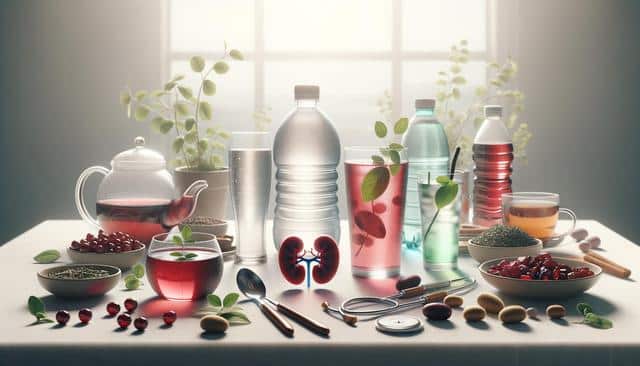
Smart Drink Choices for Managing Stage 3 Kidney Disease
Why Hydration Matters in Stage 3 Kidney Disease
Staying properly hydrated is essential for individuals managing stage 3 kidney disease. The kidneys play a vital role in filtering waste and balancing fluids in the body, and hydration supports these functions. However, the amount and type of fluids consumed can significantly impact kidney health. People with stage 3 kidney disease often experience reduced kidney function, so it’s important to avoid overloading the kidneys.
Water is one of the most suitable options for hydration. It helps with flushing out toxins and maintaining blood volume without adding any extra substances the kidneys need to process. While plain water is ideal for many, those who need variety can consider adding a splash of lemon or cucumber slices for flavor without compromising kidney health. It’s also important to:
- Monitor total fluid intake as recommended by a healthcare provider
- Avoid sugary beverages that may affect blood sugar levels
- Refrain from drinks high in sodium or phosphorus
Listening to your body’s thirst cues and consulting your medical team can help determine the right amount of fluid intake for your specific needs.
Herbal Teas: A Calming and Kidney-Friendly Option
Herbal teas can be a pleasant and health-conscious beverage choice for those with stage 3 kidney disease. Unlike regular teas or coffee, many herbal teas are naturally caffeine-free and low in potassium and phosphorus, which makes them gentler on the kidneys. However, not all herbal teas are created equal, so choosing the right ones is key.
Several herbal teas are known for their potential kidney-supportive properties. These include:
- Chamomile tea – known for its calming effects and low mineral content
- Peppermint tea – helps with digestion and contains minimal potassium
- Rooibos tea – rich in antioxidants and naturally free of caffeine
It’s important to read ingredient labels carefully. Some herbal blends may include licorice root or other additives that can affect blood pressure or interfere with medications. As with any dietary change, it’s wise to consult a healthcare professional before adding new teas to your routine.
Low-Potassium Juices: Flavorful and Kidney-Conscious
Fruit juices can be a refreshing alternative to water, but for those with stage 3 kidney disease, it’s crucial to choose options that are low in potassium. High potassium levels can be difficult for compromised kidneys to manage and may lead to a condition called hyperkalemia, which can be serious.
Some low-potassium juice options include:
- Apple juice
- Cranberry juice (unsweetened)
- Grape juice
These juices offer hydration and a hint of flavor without overwhelming the kidneys. However, they should be consumed in moderation due to their natural sugar content. Diluting juice with water can also help reduce sugar intake while still enjoying the flavor. Always check with a medical provider to ensure the juice fits within your daily potassium limits. Additionally, fresh juices made at home can be better controlled for ingredients and portion sizes compared to store-bought varieties.
Milk Alternatives and Kidney Health
Traditional dairy milk can be high in phosphorus and potassium, making it less ideal for those with stage 3 kidney disease. Fortunately, there are several plant-based milk alternatives that are more kidney-friendly. When choosing a milk substitute, consider both the nutritional content and any added ingredients.
Some suitable milk alternatives include:
- Rice milk – generally low in potassium and phosphorus
- Almond milk – low in potassium, though phosphorus content can vary
- Oat milk – often lower in phosphorus, depending on the brand
It’s important to choose unsweetened and unfortified versions, as some products are enriched with minerals that may not be ideal for kidney health. Reading nutrition labels and checking for additives such as phosphate preservatives is a good habit. Also, moderation is key—these beverages should be used as part of a varied diet that supports overall kidney function.
Beverages to Limit or Avoid
While some drinks can support kidney health, others may need to be limited or avoided altogether for those managing stage 3 kidney disease. Certain beverages can contribute to fluid retention, high blood pressure, and excess intake of harmful minerals.
Common drinks to be cautious with include:
- Carbonated soft drinks – often high in phosphorus and sugar
- Energy drinks – typically high in caffeine and additives
- Sports drinks – may contain high sodium and potassium levels
- Dairy-based shakes – often rich in protein, phosphorus, and potassium
Alcoholic beverages may also affect kidney function and interact with medications, so they should be consumed only under medical guidance. Caffeinated drinks like coffee and black tea are not necessarily off-limits but should be consumed in moderation to avoid excess fluid loss and blood pressure changes. Making informed choices about what to drink plays a significant role in maintaining kidney health and managing symptoms effectively.
Conclusion: Staying Hydrated with Kidney-Friendly Choices
Managing stage 3 kidney disease through proper beverage choices can make a meaningful difference in overall well-being. Drinks like water, certain herbal teas, and low-potassium juices can support hydration and minimize kidney stress. At the same time, it’s important to monitor intake of phosphorus, potassium, sodium, and sugar when selecting beverages. Always consult with your healthcare provider before making dietary changes, especially when dealing with chronic conditions like kidney disease. By understanding which drinks to include and which to limit, you can support your kidney health in a safe and enjoyable way.


